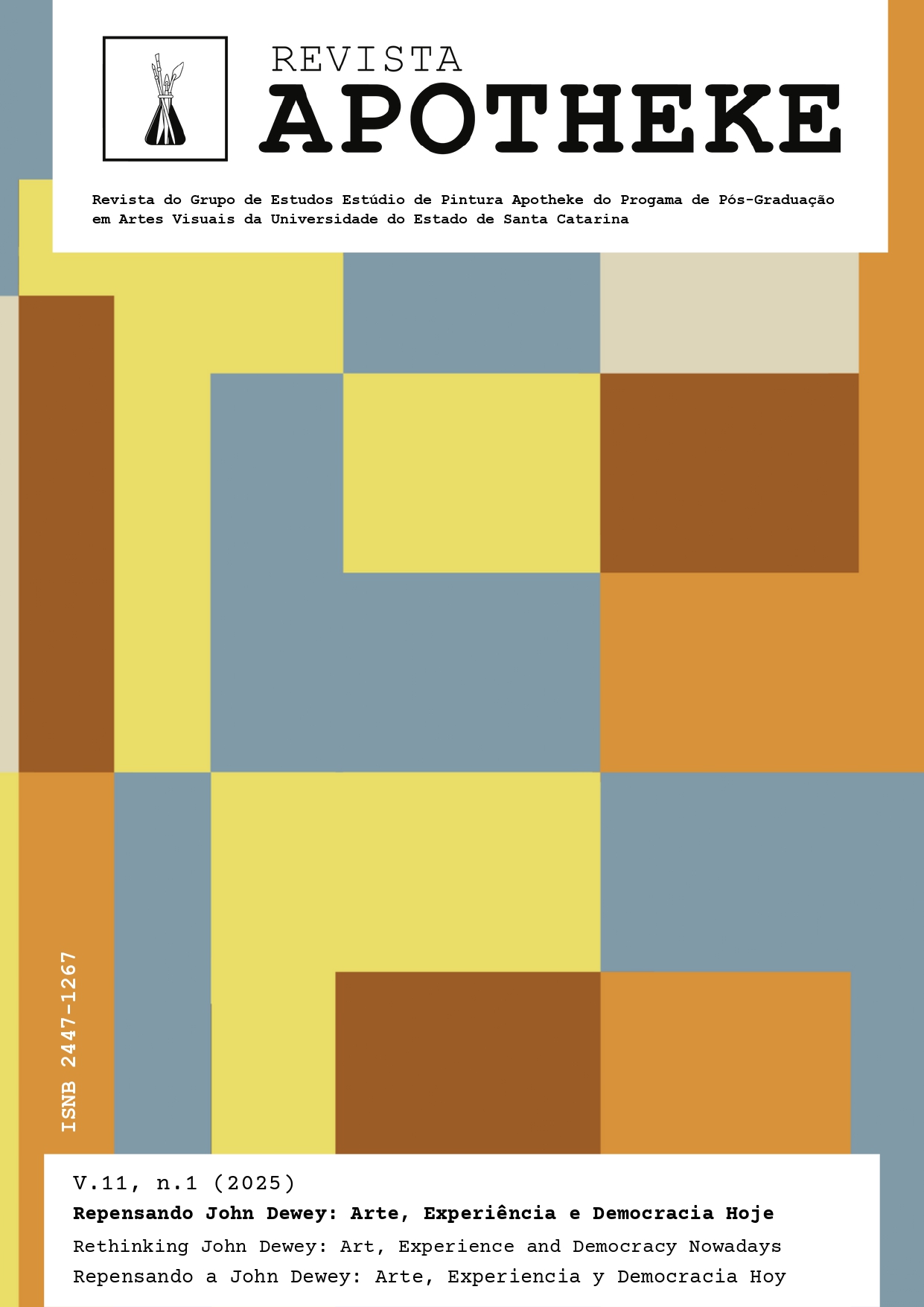The torn page: revisiting John Dewey’s pragmatic experience
DOI:
https://doi.org/10.5965/244712671112025023Keywords:
Aesthetic Experience, Reflective Thinking, Having an ExperienceAbstract
This article aims to revisit ideas from the philosopher John Dewey and suggest ways to reflect on the concept of experience for the Teaching of Visual Arts. The first section presents the influences of Dewey’s thought, recovering some approaches to experience and aesthetics in the history of philosophy to contextualize and highlight Dewey. The second section addresses mutual resonances of reflective thought and aesthetic experience. The third section disseminates the reflection of the report of a postgraduate class in visual arts, which had as its proposal to tear pages from a book and read them randomly. This proposition is described and substantiated as an aesthetic experience that enables interest, association and continuity in a teaching and learning process, or art as experience.
Downloads
References
ALEXANDER, T. M. Dewey’s Philosophy of Art and Aesthetic Experience. Artizein: Arts and Teaching Journal: Vol. 2: Iss. 1, Article 9, 2016. Disponível em: https://opensiuc.lib.siu.edu/atj/vol2/iss1/9. Acesso em: 20 abr. 2025.
ARISTÓTELES. Metafísica. Tradução de Edson Bini. Bauru: EDIPRO, 2006.
BAUMGARTEN, A. G. Estética: a lógica da arte e do poema. Trad. Miriam Sutter Medeiros. Rio de Janeiro: Vozes, 1993.
BARRANCO, M. C. Experiência estética. Enciclopédia da Sociedade Espanhola de Filosofia Analítica, Universidade de Múrcia, 2020. Disponível em: http://www.sefaweb.es/experiencia-estetica/. Acesso em: 24 mar. 2025.
CAMPEOTTO, F. La estética de John Dewey y la historia del arte: teoría y praxis. 2021. 440f. Tese (Doutorado em Filosofia) - Universidade Nacional de Córdoba, Córdoba, Argentina, 2021.
CASTRO, Sixto J. Filosofía del arte: El arte pensado. México, Herder, 2018.
CAVALLARI, P. H. V. Estúdio de pintura como campo da experiência estética. 2021. Dissertação (Mestrado em Artes Visuais) - Universidade do Estado de Santa Catarina, Florianópolis, 2021. Disponível em: http://sistemabu.udesc.br/pergamumweb/vinculos/000090/000090ae.pdf. Acesso em: 22 abr. 2025.
CAVALLARI, P.H.; LAMPERT, J. Das Conversações Sobre o Ensino de Pintura. In: COSTA, Fábio José Rodrigues; SILVA, Larissa Rachel Gomes. (Org.). A Construção e a Poiésis do(da) Pesquisador(a) em Arte/Educação. 1ed.Curitiba, Paraná: CRV, 2024, v. 1, p. 35-49.
CUNHA, A. G. Dicionário etimológico da língua portuguesa [recurso eletrônico]. Rio de Janeiro: Lexikon, 2012.
CUNHA, M. V. da; RIBEIRO, A. P.; RASSI, N. A presença de Aristóteles no livro “Como pensamos” de John Dewey. Educação em Revista. Belo Horizonte. n. 46. p. 83-107. dez. 2007.
CUNHA, M. V. da. Crítica e contexto: acerca do auditório de John Dewey. Revista Educação e Cultura Contemporânea, [S. l.], v. 5, n. 9, p. 165–178, 2019. Disponível em: https://mestradoedoutoradoestacio.periodicoscientificos.com.br/index.php/reeduc/article/view/6598. Acesso em: 22 abr. 2025.
DEWEY, J. Arte como experiência. Tradução de Vera Ribeiro, São Paulo: Martins Fontes, 2010.
DEWEY, J. Como pensamos: como se relaciona o pensamento reflexivo com o processo educativo, uma reexposição. Nova tradução e notas de Haydée Camargo Campos. 4ª ed. São Paulo: Ed. Nacional, 1979.
DEWEY, J. The complete works. The Delphi Classics Catalogue (epub). ISBN: 9781801701884. Hastings, East Sussex, United Kingdom: Delphi Publishing Ltd, 2024.
GREENFELD, Harold. The Devil and Dr. Barnes: portrait of an American art collector. New York: Viking, 1987.
HUME, D. Investigação acerca do Entendimento Humano. Col. Os Pensadores. São Paulo: Abril, 1973.
KANT, I. Crítica da razão pura. 3. ed. Trad. Manuela Pinto dos Santos. Lisboa: Fundação Calouste Gulbenkian, 1994.
RUOPPA, R. John Dewey’s Theory of Aesthetic Experience: bridging the gap between arts and sciences. Open Philosophy, 2(1), 59-74, 2019. https://doi.org/10.1515/opphil-2019-0007. Disponível em: https://www.degruyterbrill.com/journal/key/opphil/2/1/html. Acesso em: 07 mai. 2025.
SCHOPENHAUER, A. O mundo como vontade e como representação. São Paulo: UNESP, 2005.
VEBLEN, T. Kant e a Crítica do Juízo. Tradução Flávio Rocha de Deus, Occursus - Revista de Filosofia, [S. l.], v. 6, n. 2 - Jul./Dez., p. 320–333, 2024. Disponível em: https://revistas.uece.br/index.php/Occursus/article/view/10377. Acesso em: 24 mar. 2025.
WESTBROOK, Robert. John Dewey (epub). ISBN: 9788570195586. Recife: Editora Massangana, 2010.
Downloads
Published
How to Cite
Issue
Section
License
Copyright (c) 2025 Hélida Costa Coelho, Pedro Henrique Villi Cavallari, Jociele Lampert

This work is licensed under a Creative Commons Attribution-NonCommercial 4.0 International License.
Copyright and Licensing Policy
Authors of works submitted to Revista APOTHEKE authorize their publication in both print and digital formats exclusively for academic purposes. Reproduction is permitted, provided that the source is properly cited. Authors confirm the originality, authorship, and unpublished status of their manuscripts.
Articles published by the journal are freely available and intended for academic and non-commercial use only. All copyrights are transferred to the journal. The content of signed articles reflects the views of their respective authors and not the official position of Revista Apotheke. The author(s) agree to always cite the following reference when republishing or referring to the content originally published in Revista Apotheke:
“This article was originally published by Revista Apotheke in volume (insert volume), number (insert number), year (insert year), and is available at: http://www.revistas.udesc.br/index.php/APOTHEKE/index”
It is the sole responsibility of the authors to obtain written permission for the use of any material protected by copyright law included in their articles. Revista Apotheke is not responsible for copyright infringements committed by contributors.
Authors retain copyright and grant the journal the right of first publication, with the work licensed under a Creative Commons Attribution-NonCommercial License (CC BY-NC):
-
Attribution (BY): Licensees are allowed to copy, distribute, display, perform, and create derivative works, provided that proper credit is given to the author or licensor, in the manner specified.
-
NonCommercial (NC): Licensees may use the material only for non-commercial purposes.
After publication, authors retain the rights to their work and may republish the text.



